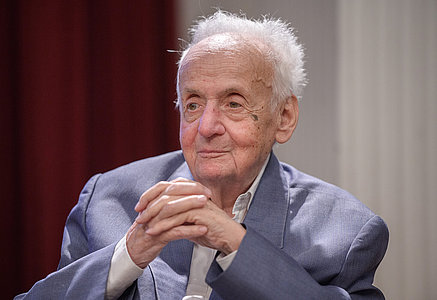Great symphonic hymns in praise of music and faith in life
Alexander Weprik (1889 – 1958): Songs and Dances of the Ghetto
Simon Laks (1901 – 1983): Poem for Violin and Orchestra
Arthur Honegger (1892 – 1955): Symphony No 3 “Liturgique” H 186
The composers Weprik and Laks, in common with the poet Sempun, all experienced existential danger, persecution and the threat of death in extermination camps. Alexander Weprik’s mother fled anti-Semitic pogroms to settle in Leipzig in 1909. This was where Weprik began his musical education and it was also here in 1929 that the Leipzig Symphony Orchestra (which was contracted to Middle German Radio from 1924) performed the world premiere of his ‘Songs and Dances of the Ghetto’. However, he made his home in Moscow, where he refused to bow to polit- ical pressure, was denounced and sent to the gulag. Simon Laks was arrested in France in 1941, arrived in Auschwitz a year later, and became a member and then leader of the men’s orchestra in Birkenau. He first wrote about music in Auschwitz in 1948, although his book about “the meaning and value of music in a world of extreme hopelessness” did not appear in German until 1988. The haunting sonority of Laks’s ‘Poem’ (1954) is clear evidence that not to know his music would be a loss. Honegger, who, like Laks, had studied in Paris and been impressed by his ‘Blues sym- phonique’, wrote numerous works that reacted to ma- jor events of his time – the occupation of France in his Second Symphony from 1941 and, in his ‘Symphonie liturgique’ completed in 1946, the end of the war. Lis- tening to music with such varied points of origin may in some small way fulfil the “mission” of Jorge Sem- prún, a prisoner in Buchenwald in 1944/45: “to share our past with each other and unite our memory, our hitherto separate recollections.”
VIOLIN Jonian Ilias Kadesha
ORCHESTRA MDR-Sinfonieorchester
CONDUCTOR Martijn Dendievel
RECITATION Dominique Horwitz
WELCOMING ADDRESS Ivan Ivanji
MEMORIAL SPEECH Bodo Ramelow
FUNDING Thüringer Finanzministerium

![[Translate to English:] © Ralf Brinkhoff](/fileadmin/_processed_/9/f/csm_gedaechtnis_buchenwald_horwitz_dominique_c_ralf-brinkhoff_abb0b5c5af.jpg)
![[Translate to English:] © Thueringer Staatskanzlei Delf Zeh](/fileadmin/_processed_/b/0/csm_gedaechtnis_buchenwald_bodo-ramelow_c_thueringer-staatskanzlei_tsk-delf-zeh_eeb976a90b.jpg)
![[Translate to English:] © MDR Kaupo Kikkas](/fileadmin/_processed_/2/7/csm_gedaechtnis_buchenwald_mdr-sinfonieorchester_c_mdr_kaupo-kikkas_d777fd6832.jpg)